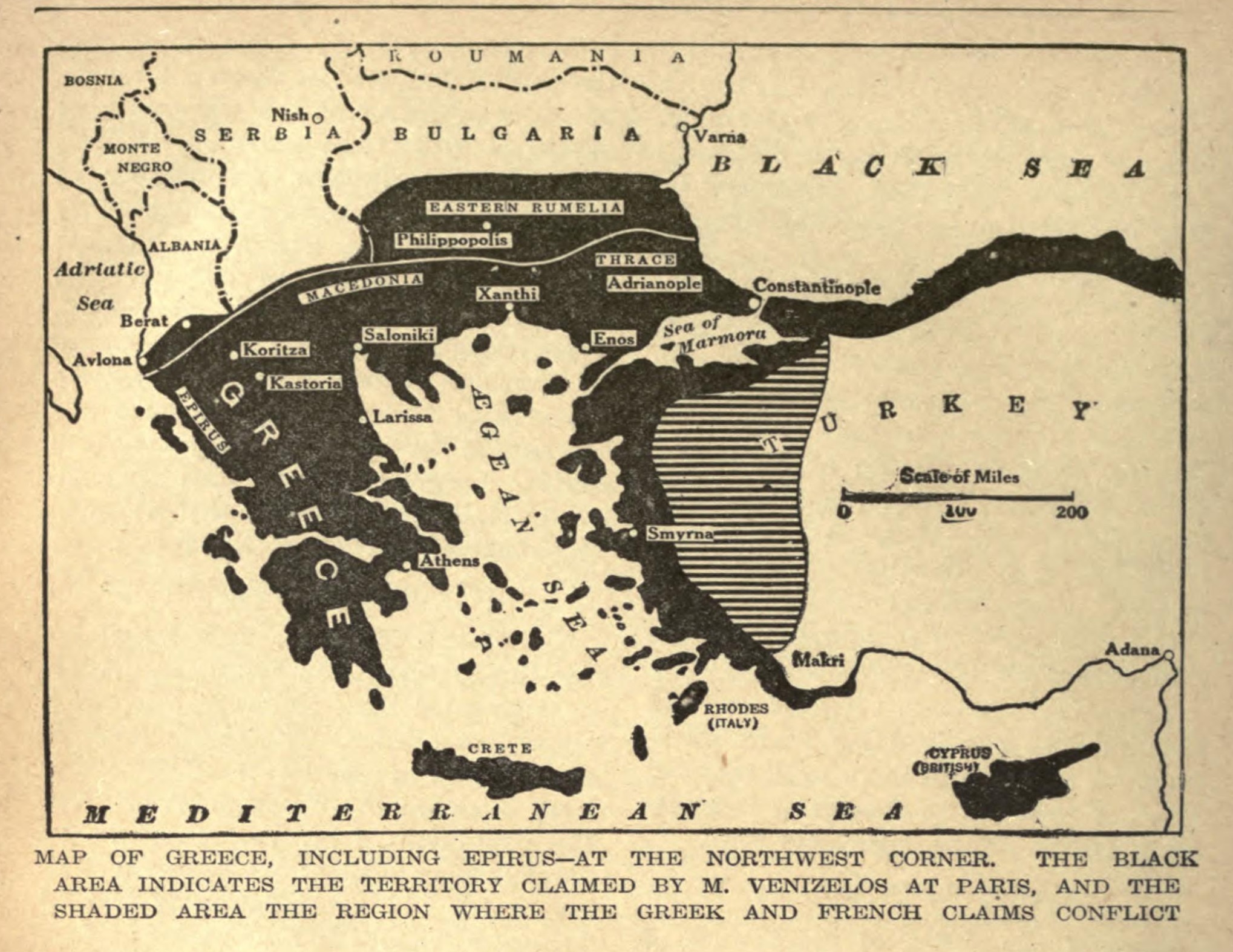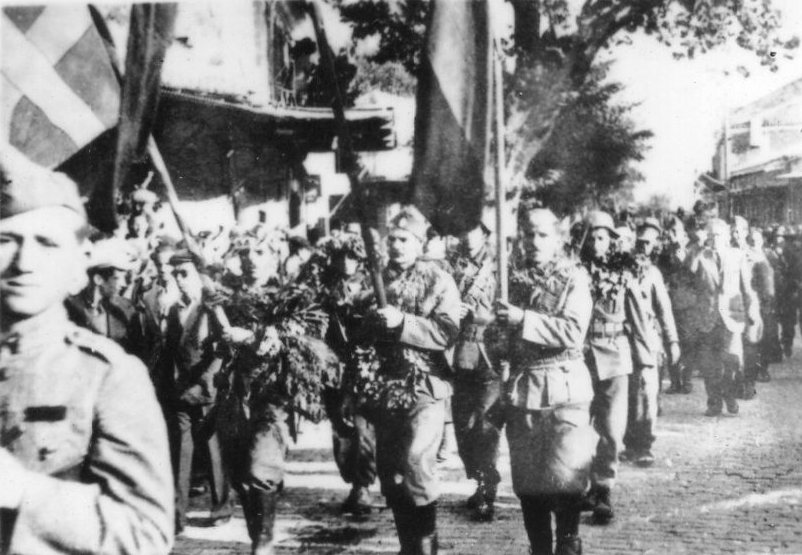|
Dimitrios Psarros
Dimitrios Psarros (; 1893 – April 17, 1944) was a Greek army officer, founder and leader of the resistance group National and Social Liberation (EKKA), the third-most significant organization of the Greek Resistance movement after the National Liberation Front (EAM) and the National Republican Greek League (EDES). In 1944, he was executed by Greek communist forces. Life Psarros was born in 1893 in the village of Chryso, in the province of Parnassida, Phocis. He attended the Greek Army Academy, and in 1916 he graduated as Second Lieutenant of Artillery. Psarros first saw action in the Balkan Wars as a volunteer, while still being a cadet in the Army Academy. In 1916 he joined the Venizelist National Defence government. He fought in the Macedonian front of World War I, the Allied intervention in the Russian Civil War (in Crimea) as a Captain, where he was injured, and in the Greco-Turkish War (1919-1922) where, thanks to his bravery, his men were able to pass into Gree ... [...More Info...] [...Related Items...] OR: [Wikipedia] [Google] [Baidu] |
Chrisso, Phocis
Chrisso () is a village in Phocis, Greece. The modern village sits north of the ancient town of Crissa, a powerful city-state of ancient Greece which gave its name to the Crissaean plain and the Crissaean Gulf and lies in the southwestern foothills of Mount Parnassus. Chrisso is 2 km southwest of Delphi, 10 km southeast of Amfissa and 6 km northeast of Itea. The Greek National Road 48 (Nafpaktos - Delphi - Livadeia) passes west of the village. Chrisso belongs to the municipality of Delphi. Historical population History The town is first mentioned in Homer's Catalog of Ships, as a Phoecean settlement that participated in Trojan War The Trojan War was a legendary conflict in Greek mythology that took place around the twelfth or thirteenth century BC. The war was waged by the Achaeans (Homer), Achaeans (Ancient Greece, Greeks) against the city of Troy after Paris (mytho ... (ca. 12th-13th century B.C.). The rubble from the ancient wall of Krissa lies in the modern Stef ... [...More Info...] [...Related Items...] OR: [Wikipedia] [Google] [Baidu] |
Greco-Turkish War (1919–1922)
The Greco-Turkish War of 1919–1922 was fought between Greece and the Turkish National Movement during the partitioning of the Ottoman Empire in the aftermath of World War I, between 15 May 1919 and 14 October 1922. This conflict was a part of the Turkish War of Independence. The Greek campaign was launched primarily because the western Allies, particularly British Prime Minister David Lloyd George, had promised Greece territorial gains at the expense of the Ottoman Empire, recently defeated in World War I. Greek claims stemmed from the fact that Western Anatolia had been part of Ancient Greece and the Byzantine Empire before the Turks conquered the area in the 12th–15th centuries. The armed conflict started when the Greek forces landed in Smyrna (now İzmir), on 15 May 1919. They advanced inland and took control of the western and northwestern part of Anatolia, including the cities of Manisa, Balıkesir, Aydın, Kütahya, Bursa, and Eskişehir. Their advance was chec ... [...More Info...] [...Related Items...] OR: [Wikipedia] [Google] [Baidu] |
Venizelist
Venizelism () was one of the major political movements in Greece beginning from the 1910s. The movement first formed under Eleftherios Venizelos in the 1910s and saw a resurgence of support in the 1960s when Georgios Papandreou united a coalition of old Venizelists and nationalist politicians. The movement was characterized by the beliefs of Eleftherios Venizelos and the ideas of Greek irredentism supporting the Megali Idea. It had a Francophile stance as the ideas of the French Revolution and the idea of one state which should have all the lands predominantly inhabited by a single ethnicity. In WWI, the Venizelists wished to join the Entente, mainly due to the entrance of the Ottoman Empire and Bulgaria, which was one of the highest chances to gain all lands Greeks claim and thus fulfilling the Megali idea. Despite popular misconceptions, Venizelism is a movement that sides with monarchy, and it calls for a ruling class in which the urban class can rise to the ranks by merit. ... [...More Info...] [...Related Items...] OR: [Wikipedia] [Google] [Baidu] |
Greek Army Academy
The Hellenic Army Academy (, ΣΣΕ), commonly known as the Evelpidon, is a military academy. It is the Officer cadet school of the Greek Army and the oldest third-level educational institution in Greece. It was founded in 1828 in Nafplio by Ioannis Kapodistrias, the first governor of the modern Greek state. It is often listed as one of the top 10 military academies worldwide by various websites and magazines. Overview The institution was created to provide officers for all the Arms of the Hellenic Army (Infantry, Armour, Artillery, Signals, Engineering, and Army Aviation), as well as some of the Corps (the Technical Corps, the Transport and Supply Corps, and the Ordnance Corps). By contrast, officers in the Legal Corps, the Medical Corps, the Finance Corps, and the Auditing Corps are graduates of the Corps Officers Military Academy (), with the exception of nurse officers in the Medical Corps, who are graduates of the Nurse Officer Academy (). The School also trains cadets on ... [...More Info...] [...Related Items...] OR: [Wikipedia] [Google] [Baidu] |
National Republican Greek League
The National Republican Greek League (, ''Ethnikós Dimokratikós Ellinikós Sýndesmos'' (EDES)) was a major anti-Nazi resistance group formed during the Axis occupation of Greece during World War II. The largest of the non-communist resistance groups, its military wing, the National Groups of Greek Guerrillas (Εθνικές Ομάδες Ελλήνων Ανταρτών, ''Ethnikés Omádes Ellínon Antartón'' (ΕΟΕΑ)) concentrated its military activities in Epirus. From 1943 onwards, EDES came into confrontation with the communist-led National Liberation Front, beginning a series of civil conflicts that would lead to the Greek Civil War. Foundation and ideology The National Republican Greek League was founded on 9 September 1941 by a former army officer, Colonel Napoleon Zervas, a Venizelist who had been expelled from the army after the failed coup d'état of 1935, and two companions, Leonidas Spais and Ilias Stamatopoulos.Fleischer (1990), p. 150 Like many other re ... [...More Info...] [...Related Items...] OR: [Wikipedia] [Google] [Baidu] |
National Liberation Front (Greece)
The National Liberation Front (, ''Ethnikó Apeleftherotikó Métopo'', EAM) was an alliance of various political parties and organizations which fought to liberate Greece from Axis Occupation. It was the main movement of the Greek Resistance during the occupation of Greece. Its main driving force was the Communist Party of Greece (KKE), but its membership throughout the occupation included several other leftist and republican groups. ΕΑΜ became the first true mass social movement in modern Greek history. Its military wing, the Greek People's Liberation Army (ELAS), quickly grew into the largest armed guerrilla force in the country, and the only one with nationwide presence. At the same time, from late 1943 onwards, the political enmity between ΕΑΜ and rival resistance groups from the centre and right evolved into a virtual civil war, while its relationship with the British and the British-backed Greek government in exile was characterized by mutual mistrust, leading ... [...More Info...] [...Related Items...] OR: [Wikipedia] [Google] [Baidu] |
Greece
Greece, officially the Hellenic Republic, is a country in Southeast Europe. Located on the southern tip of the Balkan peninsula, it shares land borders with Albania to the northwest, North Macedonia and Bulgaria to the north, and Turkey to the east. The Aegean Sea lies to the east of the Geography of Greece, mainland, the Ionian Sea to the west, and the Sea of Crete and the Mediterranean Sea to the south. Greece has the longest coastline on the Mediterranean Basin, spanning List of islands of Greece, thousands of islands and nine Geographic regions of Greece, traditional geographic regions. It has a population of over 10 million. Athens is the nation's capital and List of cities and towns in Greece, largest city, followed by Thessaloniki and Patras. Greece is considered the cradle of Western culture, Western civilisation and the birthplace of Athenian democracy, democracy, Western philosophy, Western literature, historiography, political science, major History of science in cl ... [...More Info...] [...Related Items...] OR: [Wikipedia] [Google] [Baidu] |
Hellenic Military Academy
The Hellenic Army Academy (, ΣΣΕ), commonly known as the Evelpidon, is a military academy. It is the Officer cadet school of the Greek Army and the oldest third-level educational institution in Greece. It was founded in 1828 in Nafplio by Ioannis Kapodistrias, the first governor of the modern Greek state. It is often listed as one of the top 10 military academies worldwide by various websites and magazines. Overview The institution was created to provide officers for all the Arms of the Hellenic Army (Infantry, Armour, Artillery, Signals, Engineering, and Army Aviation), as well as some of the Corps (the Technical Corps, the Transport and Supply Corps, and the Ordnance Corps). By contrast, officers in the Legal Corps, the Medical Corps, the Finance Corps, and the Auditing Corps are graduates of the Corps Officers Military Academy (), with the exception of nurse officers in the Medical Corps, who are graduates of the Nurse Officer Academy (). The School also trains cadets on ... [...More Info...] [...Related Items...] OR: [Wikipedia] [Google] [Baidu] |
1944
Events Below, the events of World War II have the "WWII" prefix. January * January 2 – WWII: ** Free France, Free French General Jean de Lattre de Tassigny is appointed to command First Army (France), French Army B, part of the Sixth United States Army Group in North Africa. ** Landing at Saidor: 13,000 US and Australian troops land on Papua New Guinea in an attempt to cut off a Japanese retreat. * January 8 – WWII: Philippine Commonwealth troops enter the province of Ilocos Sur in northern Luzon and attack Japanese forces. * January 11 ** United States President Franklin D. Roosevelt proposes a Second Bill of Rights for social and economic security, in his State of the Union address. ** The Nazi German administration expands Kraków-Płaszów concentration camp into the larger standalone ''Konzentrationslager Plaszow bei Krakau'' in occupied Poland. * January 12 – WWII: Winston Churchill and Charles de Gaulle begin a 2-day conference in Marrakech. * Janua ... [...More Info...] [...Related Items...] OR: [Wikipedia] [Google] [Baidu] |



